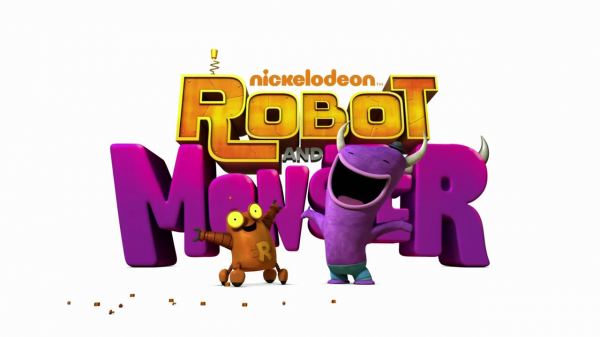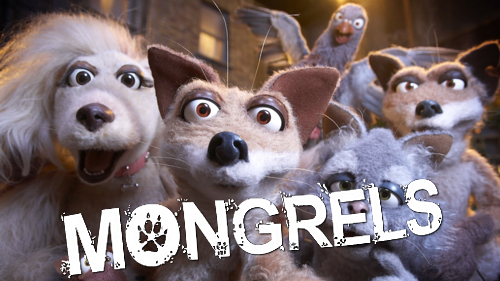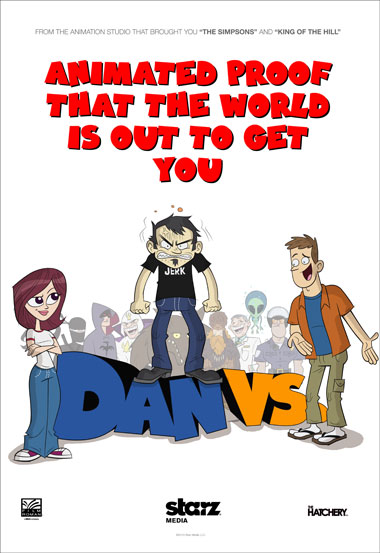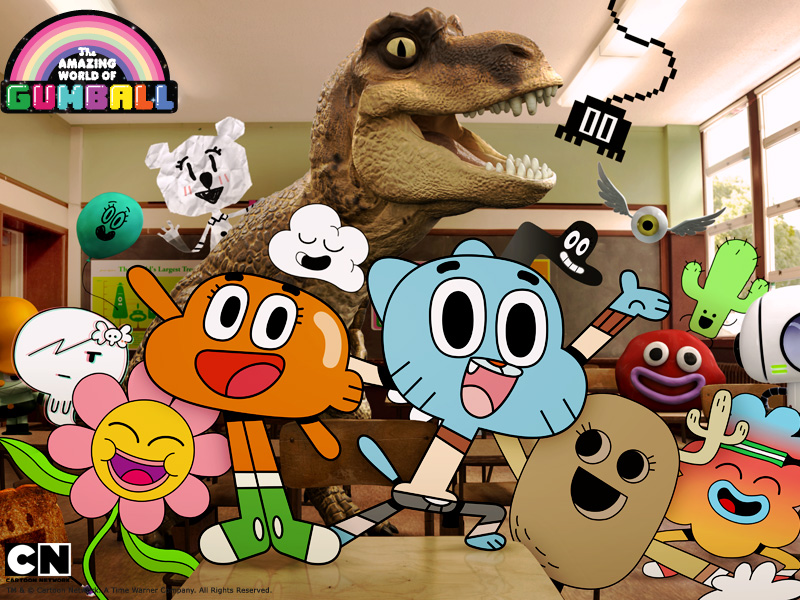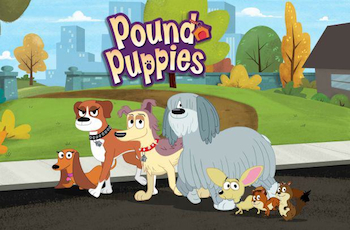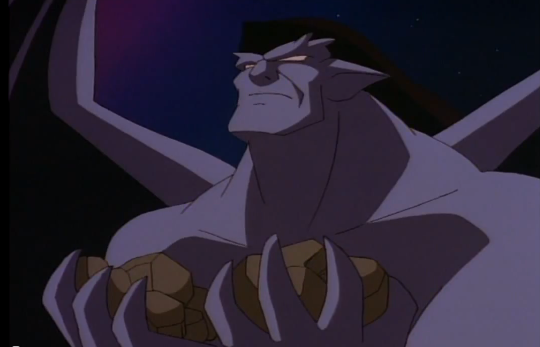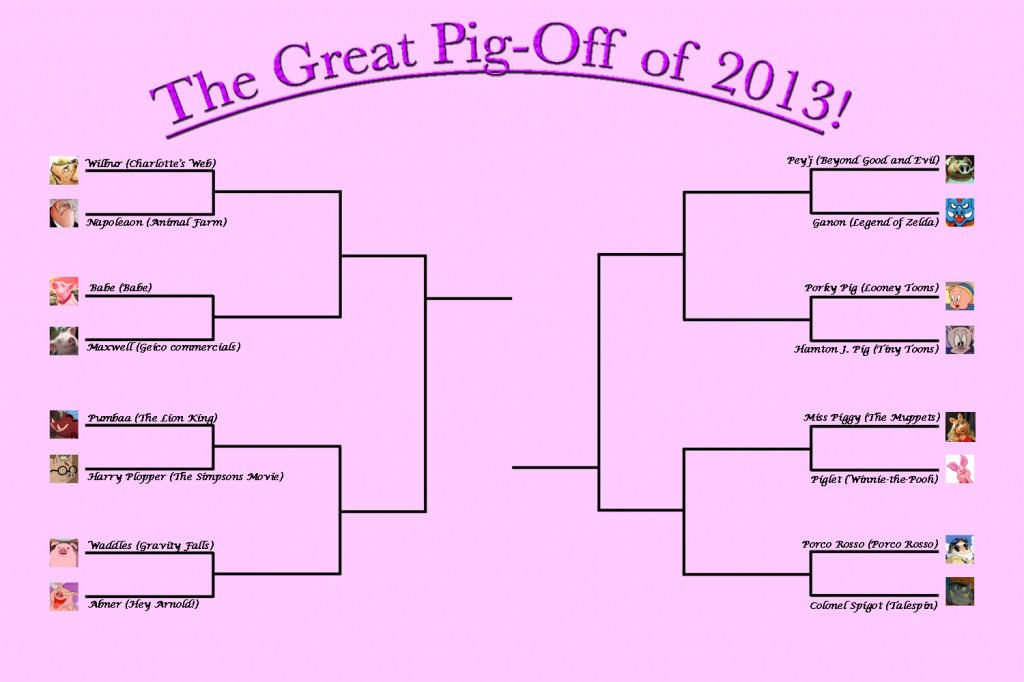Posts Tagged Television
5 Recent-ish Shows You Need to Watch (or at Least Give Them a Chance)
Posted by kjohnson1585 in Animation, Television, Uncategorized, Writing on July 17, 2013
1) Robot & Monster (available on iTunes)
Premise: Two best friends live together in a bizarrely askew world of Mechanicals (robots) and Organics (monsters).
Why it’s Off-Putting: Robot & Monster seemed like it was cooked up as a precursor to a pay-to-play kids MMO game. Choose your race! Design your character! Buy a bunch of shit! Be like the characters from this TV show! Also, with its blimps, quirkiness, and obsession with bacon, it gave off a way too strong “HEY INTERNET!” vibe.
Why it’s Brilliant: Underneath the quirk is a surprisingly smart and well thought-out show that deepens the characters and seeks to explain its quirks one episode at a time. Robot’s childhood is as sad as it is funny, tortured by his big brother Gart and aggressively ignored by his mother, both of whom make no attempt to hide their contempt for him (and his grandmother speaks in BINARY!). Monster is childlike in his innocence, but manages to maintain a certain amount of adorableness, mainly when his blind devotion and friendliness spreads to others. Weird moments and visuals are given context, doled out across several episodes, breathing life into events that seem like arbitrary design decisions. Robot and Monster’s TV is black and white, but they compete in a contest to get a color one, re-contextualizing black and white TV as the quirky norm. The show is filled with these small reveals.
But the best part is that Robot and Monster has perhaps one of the best secondary casts of animated cartoons in the past few years. Ogo is an inexplicable stalker of the titular characters, knowing more about them they know themselves, tracking their every move, and planting cameras all over their apartment, to a creepily hilarious degree. Mr. Wheelie, their landlord, hates them for no good reason. Punch Morley is a former polo-player turned security guard who’s as strong as he’s moronic (his mental degeneration is definitely implied to be a result of his sport-playing days). And JD and Spitfire are two crazy, rambunctious gals who go around and fight crime… and fight anyone else, really. Oh, and there’s Perry, a pipe with a stuck-on smile who is abused in some of the funniest ways possible.
Must Watch Episodes: “Between Brothers,” “Hornica,” Ogo’s Birthday,” “The Party,” “Baconmas.”
2) Mongrels (available on Hulu and region 2 DVD)
Premise: Five crude animals live in a back alley and get into all sorts of surreal, crazy situations.
Why it’s Off-Putting: Puppetry (well, it’s really “Muppet-ry”) tends to put audiences off, unless it’s the Muppets themselves. It wasn’t particularly marketed well, and BBC 3 seemed very uncomfortable with what was essentially Family Guy meets The Muppets. British audiences don’t really like their TV “pushing the envelope” in terms of edginess.
Why it’s Brilliant: Hidden behind the excessive crudeness is a hilarious show that contextualizes the crudeness and pop culture references so even audiences across the pond could understand. It also helps that the characters are strong enough at their core so that non-fans of the poor-tasting jokes could at least love the characters instead. Nelson, the metrosexual star, is an earnest go-getter who often gets pushed around by Destiny (an aggressive, diva dog) and Vince (a foul-mouth sociopath fox), but has a decent friend in Marion (a moronic but loveable cat) and, to a much lesser extent, Callie (a sharp-tongued bird). The show bounces liberally through cutaways, montages, and throwbacks, all among gags harping on 9/11, abuse, racism, and even neutering. But the very nature of the puppets blunt the impact, especially when you realize how terrible (in an entertaining way) these characters are.
Beyond that, though, on a technical level, the show is top-notch. The puppet work is as good as, and even better than at some times, the Muppets. In HD, the show looks beautiful, with the cinematography and lighting highlighting the puppets eyes to really make them come alive. Excellent casting allows the voices to hit every note. Montages, again, are so smartly done and technically well-produced, ESPECIALLY when they parody famous music videos. And I’ve yet to honestly see a show that generally uses music so perfectly, whether in parodies, background scores, karaoke, scene transitions, or key moments. In some ways it’s remarkable that a show like this existed, and was done so well.
Must Watch Episodes: “Nelson the Online Predator,” “Nelson the Stroke Virgin,” “Nelson the Naughty Arsonist,” “Marion and the Force-Field,” “Nelson and the C***’s Speech”
3) Dan Vs. (available on iTunes and currently airing on the The Hub. Check local listings!)
Premise: A psychopath rages war on various mundane things along with his push-over friend, leading to bizarre and surreal situations.
Why it’s Off-Putting: It’s completely and utterly an anomaly on The Hub’s lineup of shows. It’s a bit more adult-oriented, and while the content isn’t explicit at all, Dan Vs. is a bit strange to see and experience. It’s also an odd premise to hang one’s hat on; on the surface, it doesn’t sound appealing.
Why’s it’s Brilliant: Dan, voiced by Curtis Armstrong, is perfectly cast. Armstrong brings the unrestrained menace to his VO work, while maintaining the whiny undertone to keep Dan Vs. from going too dark. Dan’s plans to destroy whatever he hates – exercise, stupidity, skiing, reality TV, dancing, etc. – are wonderfully outlandish, in a Pinky and the Brain kind of way. The show is funny as all hell, and it’s always a treat to see how far things get with Dan on the warpath.
There was always a chance that secondary characters Chris (voiced by Dave Foley) and Elise (voice by Paget Brewster) would ruin the surreal fun. Luckily, the writers were aware of this early on and worked to make them both interesting as well. Elise has her own dark secret – being a high-level, top secret agent who works for a semi-inept government agency, and Chris is a charming if sad soul who overeats and follows Dan around due to his own lack of agency in his life (he’s the Dr. Watson to Dan’s hostile Sherlock Holmes). Things grow even more complicated with Elise’s parents, who hate both Dan AND Chris. Elise’s mom, also, is a secret agent who works for a corporation, and just happens to be Elise’s arch-enemy. All this in the midst of the insanity of Dan’s revenge schemes. If that sounds like too much, at least watch it so Dave Foley can continue to get paid and get himself out of his exorbitant debt.
Much Watch Episodes: “New Mexico,” “The Barber,” “Elise’s Parents,” “The Wedding,” “The Family Cruise”
4) The Amazing World of Gumball (available on iTunes and currently airing on Cartoon Network)
Premise: A blue cat and his brother live in an insane, multi-animated world where almost anything can happen.
Why it’s Off-Putting: Gumball’s core character design isn’t appealing at first glance, and the various characters, all of which are animated in various different styles (hand drawn, stop-motion, CGI) just do not look like they will work. It has the appearance of a foreign, experimental film, and the first few episodes are simply passable.
Why it’s Brilliant: I wrote about this before, but it bears repeating. Somewhere along the line, late in season 1 but definitely in season 2, Gumball took off. I’m not sure if it was because of a bigger budget, but the cacophony of variable animation styles blend together so incredibly well that it defies every and all expectations. It makes Paperman look amateurish. Watching an anime-ish designed character interact with a 3D designed character on top of a filmed set is beautifully rendered, and even when the action speeds up or the scene requires tricky editing, everything flows beautifully.
I think the key to what makes the show shine is how the writing is A PART OF the animation. They don’t seem like separate entities. There’s usually two schools of thought here: storyboarders are the writers, or the writers write and storyboarders storyboard. Gumball FEELS like it’s all one heavily connected unity, from the original pitch in the writing room to the final audio mix. This results in a such a glorious assault on the senses, leaving your eyes as satisfied as your funny bone. The characters are so fun – Nicole, Gumball’s mother, is a fantastic standout – and they get into deliciously crazy situations that have set pieces that, quite honestly, will leave you breathless, both in laughter and in utter awe. (As I write this, this may be my favorite show on the air right now.)
Must Watch Episodes: “The DVD,” “The Fight,” “The Words,” (DEFINITELY “THE WORDS”), “The Treasure,” “The Job”
5) Pound Puppies (available on Netflix and iTunes)
Premise: A group of specialized canines work to find and match pups and dogs to their proper owners.
Why it’s Off-Putting: The original designs for this updated show were, in short, horrendous. And the first seven episodes are embarrassingly based on them. The cutesy premise seems geared towards a much younger audience, which is more akin to Blue’s Clues or Rollie Pollie Ollie.
Why it’s Brilliant: Pound Puppies saves itself by taking the cutesy premise and exploring it in its entirety, emphasizing the sad, depressing elements that go along with being alone and unloved. The show (in kiddie fashion, of course) deals with ideas of being an orphan, of abandonment and loneliness, of companionship and friendship. Each of the members of the Pound Puppies come off as stereotypes at first, but slowly grow into their individual selves. While not a funny show, there’s a soft warmth to it that resembles the warm tones prevalent in Hey Arnold and Recess – mainly because they share similar writing staffs. Also helping was DHX taking over animation duties from episode 8 onward, so the show looks less butt-ugly than before.
The second season, admittedly, was a far cry from the first, falling into the same trap that seems to hurt MLP’s second and third season, becoming goofier and sillier, moving away from the intriguing dramatic tinge of the first. Still, it has a lot of heart and Erik McCormick as Lucky is in some ways my favorite VO work on the air right now. And hearing Michael Rappaport’s distinct New York’s accent come out of a dog’s mouth is always funny.
Must Watch Episodes: “The General,” “Taboo,” “I Never Barked for My Father,” “Mutteral Instincts,” “Pound Preemies”
CHILDHOOD REVISITED – Gargoyles “Awakening”
Posted by kjohnson1585 in Animation, Childhood Revisited, Television, Writing on July 15, 2013
Jumping around the Disney Afternoon lineup to review their various shows have been proven troublesome; because shows were syndicated on different networks and randomly aired in different markets, it’s tricky to get a bead on what aired first and where. Plus, there’s a difference in which episodes aired first and which episodes were produced first. Disney Afternoon shows had no reason or incentive to be in any order, which is perfectly fine for any TV program, but it makes it rather difficult to note any callbacks, or to put certain plot or character reappearances in context – when Gosalyn’s Quivering Quack returns in “Paint Misbehavin’,” Darkwing references her previous appearance in “Quivering Quack,” but if the former aired prior to the latter in syndication, viewers would have no idea what he’s talking about. (This makes it even trickier for Rescue Rangers, I’ve recently learned – the 5-parter that brings the team together wasn’t even produced first, let alone aired first.)
Gargoyles, created by Greg Weisman and which aired in October of 1994, was always a show I always wanted to tackle, but I wanted to cover the other cartoons – Ducktales, Darkwing Duck, The Wuzzles – first. I remember not quite liking this show when I was young, but then again, I distinctly remember thinking that it was a show that I would’ve love when I was older, a sentiment I shared with TaleSpin. Gargoyles came about when the first wave of 90s action cartoons became a huge hit – specifically, Batman: The Animated Series. As far as copying styles go, Gargoyles definitely has a solid amount of cache, according to its fervent fanbase. (Perhaps not so much for the Goliath Chronicles, which were made sans Weisman and his team. I’m not sure how I will approach the non-canon season at this point). Action cartoons have a lot more going for them than their comedic counterpart, so I decided to give it the episodic coverage treatment.
“Awakening” is the five-part movie introduction to the gargoyles and the setting. It was clearly created to be a straight-forward movie and not split into five episodic parts, but it isn’t as if splitting things up harmed things in any real way. “Awakenings” has a somewhat shaky and unclear start, but as the events and plot points comes along, a good amount of tension and intrigue develops, and Goliath learns the harsh lesson that being an sadistic asshole isn’t confined to humans.
We’re introduced to Elisa Maza first, a smart and formidable New York detective, arriving at the scene of falling debris that is careening from the top of a building. When she notices claw marks in the stones, we flashback to Scotland, 994 AD. An invading hoard attempts to ransack a castle, and the green-clothed soldiers attempt to defend it. Among the chaos, there’s talk (from the good and bad sides) about sundown and the nightly reveal of “monsters”. Sure enough, as the sun disappears into the horizon, the great stone gargoyles break open to reveal the flesh-and-blood gargoyles underneath, and the beasts beat back the hoard with aggressive gliding and brute strength. We’re introduced to the main clan at this point. Goliath clearly is the leader, but we’re also shown Broadway, Lexington, Hudson, Brooklyn, Bronx, and Demona – but at this point they don’t have names. Just distinct looks and attitudes.
The intro is one of those really awkward things that need to be set up for the great payoffs down the line, but it’s awkward nonetheless. I’m certainly not bothered by the prejudicial attitudes the humans exhibit early on – the commonfolk and Princess Katharine dismiss the Gargoyles and shit on them when they stop by the main dining hall – it’s just difficult to justify that attitude right after the gargoyles saved them. I mean, it’s an attitude I understand, but it’s not consistent – when the gargoyles save them later, they suddenly love the creatures, which goes against the idea of their prejudice as deep-seeded and cultural – so it comes off less conditional and more that the script demanded. Still, it’s a nice scene that sets up not only the humans’ hatred, but Demona’s growing frustration at such attitudes, and the “support” of the captain. It also sets up a bit of misdirection, when Magus, a mage who obviously supports and secretly loves the princess, expresses his disapproval at the gargoyles, then is seen scanning a book of spells ominously.
“Awakenings” suggests that love and loyalty, while powerful, blinds us and confuses us. The road to hell is paved with good intentions, and the season premiere is about these well-meaning intentions utterly falling apart due to rage, passion, emotions, and poor judgment. After the Magus scene, a figure approaches the invading hoard with a proposition. We cut back to the castle, where the captain and Demona suggest that Goliath and the gargoyles go and finish off the hoard. Goliath, vicious but not genocidal, only takes Hudson to scare them off for good, his reasoning is that he doesn’t want his clan to get hurt. Whoops. As it turns out, the Goliath and Hudson track a decoy group of said hoard, and are caught outside the castle as day breaks. They turn to stone quite a ways from the castle, and the hoard then tries to take the castle again. The soldiers defending the castle find out their bows were cut, and someone conveniently opens the portcullis to let them in. The hoard wins, and the captain is revealed to be the traitor. “These are not my people,” the captain says when asked why he betrayed them, a statement that’s a bit unclear at first, but it suggest that he took the princess’s slight against the gargoyles personally. After all, they fought for him, too – the captain most likely sees the gargoyles as his own men. It is extreme, though, that he’d betray the entire castle and, you know, his OTHER men for such a slight. It would have been good to see exactly why the captain felt so strongly for the gargoyles over his human soldiers, enough so to goddamn sabotage their bows and ultimately put their lives at risk. Hopefully this pays off later in the show. The real kicker is that the captain of the hoard, Hakon, destroys the stoned gargoyles, despite the captain’s protests. Both Goliath and the captain attempted to protect the gargoyles, but in their decisions, doomed them.
But don’t worry, it gets worse. Magus and Princess Katharine (as well as the commonfolk) are captured and led out the castle. Nightfall comes, and Goliath and Hudson return to see their brethren destroyed, including Demona, Goliath’s lover and second-in-command. We see that Bronx, Brooklyn, Lexington, and Broadway survived, as well as the eggs, so there’s some hope. Still, revenge is in the air, so they all go to save the humans and enact some justice. This triggers a set of tragedies that brings the “love/loyalty dooms us” theme to the forefront. Hakon and Captain Benedict Arnold suggest ransoming Magus and the princess, but when the gargoyles arrive, things go crazy, and Hakon almost kills Katharine. Magus flips out, assuming that there’s no way she’d survive when the princess escapes and the captain/Hakon gives chase. Magus escapes his binds as the gargoyles unload into the invaders, and as Goliath chases the three escapees, Magus, in his infinite rage, turns the remaining gargoyles into stone. Goliath prepares to unload on the captain due to his betrayal, but then the captain and Hakon betray EACH OTHER, and they fall off a cliff in their own scuffle. Goliath saves the princess, but rages over not earning his revenge. He THEN returns to see the rest of his clan turned to stone. Christ. Goliath is having one shitty night.
Magus and Princess Katharine are deeply sorry, though, and they do the best thing they can – promise to protect the eggs and turn Goliath into stone along with his clan. It’s a hollow, sad moment. Goliath certainly didn’t earn this. It just happened. Everyone thought they were doing the right thing, for love, for honor, for safety, and a whole lot of terrible things happen. Gargoyles may skimp on its story transitions – breaking the stone curse by putting the castle above the clouds is a particularly “it’s in the script” development – but it doesn’t skimp on the themes of altruism not happening in a void, especially with people with their own sinister motivations. This becomes clear some thousand years later when Xanatos (think of him as Disney’s Lex Luthor), upon discovering Magus’s book, brings the castle to New York and repairs it high above the clouds and releases the gargoyles from their curse. Goliath and his crew emerge relived but jaded, distrustful of the humans that betrayed them. But Xanatos may be their only hope.
What happens next is great to watch but not particularly meaningful, save for the relationship that develops between Goliath and Elisa. A bit of investigation of the clawed rock leads her to discover gargoyles and, after saving her life, the two develop a connection. I’m not too fond of the romantic implications of it, but the platonic stuff is great – especially their mutual distrust of everyone around them. There’s a couple of scenes where Elisa and Goliath explore the city, Hudson and Bronx get acquainted to barcaloungers and television, and Lex, Brooklyn, and Broadway have surprisingly amusing encounters with taxis and motorcycles (they also develop their core traits – Lex and his fascination with technology, Brooklyn and his love for the minutia of modern society, Broadway and his lovable oafishness and “passion” for food). It’s a nice setting up of future events and some cool action sequences, including my favorite: Goliath, stuck away from his castle again when the sun rises, turns to stone, so Elisa herself has to lure AND take down five armed henchmen in Central Park (or a facsimile of it). It’s a great High Noon-esque sequence, Elisa using her wit and stealth skills to take the henchmen out one-by-one.
Goliath and Elisa’s relationship develop into something real and poignant, two people who need each other in a world that threatens to overwhelm them. It comes in contrast to the manipulative Xanatos, who seems to be attacked by a rival corporation that stole a series of discs. He asks the gargoyles to help him retrieve the discs in three separate locations – which comes off a little too video gamey for my tastes – and as an extra incentive, he reveals Demona to be alive. Goliath, struck by the return of his love, agrees with her to help Xanatos. The action sequences are quite exciting, where Lex/Broadway/Brooklyn breaks into a building, Hudson and Bronx take on an underground base, and Goliath and Demona go after an airship. It’s in the airship that Goliath notices how vicious and cold Demona has gotten – she is more than eager to let the humans die for this disk. She even causes the entire ship to crash, much to his horror. Even in his massive distrust for humans, he has yet to resort to the casual killing of them.
That might be because of Elisa, who helped him greatly get acclimated to the new world. Xanatos thinks that the mission and Demona earned Goliath’s true loyalty, but he still goes off to see Elisa. In a perfect piece of parallelism, Goliath’s sense of devotion, which doomed him back in 994 AD, leads him to the truth in 1994, when Elisa reveals that the whole disc thing was a crock of shit, planned by Xanatos (more or less – it’s actually kinda unclear) to manipulate the gargoyles into his trust, and, um, use them as guinea pigs to study for his own robotic gargoyles creations. Or something – again, it’s a bit unclear here.
Still, we get an awesome sequence of gargoyles fighting (and destroying) robots, and one final encounter between Demona and Goliath, the former of which reveals everything – how she made a deal back in 994 with the captain, how Goliath was supposed to lead all the gargoyles away as the hoarders invaded (so they could return to the castle and take it over), how the captain tried and fail to protect the stone gargoyles, how she lived through the ages as a monster, while simultaneously seeing humanity become their own sort of monsters, to come to today and her uneasy alliance to Xanatos to rid the… let’s say city for now… of humans (considering the fact that Xanatos is a human, that is a “knife-behind-the-back” agreement if I ever saw one). Goliath is crushed by this reveal, and before Demona blows his head off with a bazooka (her knowing how to use human technology is a really nice touch and contrast to Goliath estrangement), Eliza comes in and saves the him. Stuff blows up, Demona disappears, Xanatos is arrested, and the gargoyles are tentatively at peace.
Of the entire tumultuous if thrilling ending, the deal with the captain and Demona makes the least sense, partly because it’s really difficult to see where the captain’s loyalty really lies, and, again, why he would risk human life over the gargoyles. It would have worked better if the captain seemed offensively jaded by humanity penchant for cruelty, but he certainly doesn’t come off that way. This, and Xanatos’ plan with/against the gargoyles showcases Gargoyles opening day flaws – the internal mechanisms of its most complex plans don’t fully congeal. But the core of Gargoyles storytelling is its strongest. Motivations and intentions are clear, and when it all goes down in flames, people and gargoyles alike are left stranded, hurt, or even killed. “Awakenings” sets a tone for the first season. It’ll be fun, but it won’t be pretty. Don’t trust anyone but yourself, and even then, that may lead to ruin.
GRADE: B+
(The show is pushing 20 years old now, but I would still recommend SPOILER alerts in the comments, if you plan to touch upon developments in the show’s future.)
The Great Pig-Off of 2013!
Posted by kjohnson1585 in Animation, Film, Television, Uncategorized, Video Games, Writing on July 12, 2013
PLEASE NOTE: Normally, I wouldn’t do this – it’s usually in bad taste, makes the author seem wishy-washy, and suggests things could change at the drop of a hat. But missing Miss Piggy I felt was too big a mistake to let go. So I threw out all the results, revised the brackets (sorry Pig from Back at the Barnyard!), and reposted the polls again, to really find out who the best pig is. Sorry for this, but I definitely thought it was a necessary change. So, if you wouldn’t mind, please vote again!
Dear internet: the flamewars need to stop, now. I hate going to various websites and seeing the comment section erupt into a battle of… non-wits over this. It sickens me. I know we can do better, but until this thing is put to rest, we will continue to belittle and bemoan everyone and everything they stand for.
This ends now.
THE GREAT PIG-OFF OF 2013.
Finally, in our great history of noteworthy pigs, boars, warthogs, and pig-boar-warthog-men, we will determine beyond a shadow of a doubt, which pig is the best pig of all time. OF ALL TIME. The results of this bracket cannot be contested. The final outcome will be law, the next amendment to our great and wonderful Constitution. Any and all protest will be dealt with immediately. Void where prohibited.
Vote now. Get your friends to vote. Your family. By gunpoint if need be. Because this is the end of all things. Of all PIG things. RECOGNIZE.
I) Literary/Allegorical Edition
1) Wilbur (Charlotte’s Web) – The venerable star of this classic children book is a comely, fat oinkster who comes dangerously close to being chopped up into bacon and perhaps some ham. Luckily, plucky spider and blood-sucker arachnid Charlotte uses her extreme spelling skills to shock humans into thinking that Wilbur is terrific and radiant. What does she get for her efforts? An overly-dramatic death scene. Still, Wilbur ends up taking care of her three sickly spiders children (of the millions that hatch and haul ass). Some pig indeed.
2) Napoleon (Animal Farm) – I regret admitting I have not read this book, so I will let Wikipedia sum it up: ” ‘A large, rather fierce-looking Berkshire boar, the only Berkshire on the farm, not much of a talker, but with a reputation for getting his own way’. An allegory of Joseph Stalin, Napoleon is the main villain of Animal Farm. In the first French version of Animal Farm, Napoleon is called César, the French form of Caesar, although another translation has him as Napoléon.” So yeah, COMMUNISM.
Wilbur or Napoleon?
- Wilbur (67%, 33 Votes)
- Napoleon (33%, 16 Votes)
Total Voters: 49
II) Animatronic Edition
1) Babe (Babe) – Babe, the curious piglet that seems to have a knack for bizarre adventures, earned an unrequited amount of love by treating sheep with respect and winning a sheep herding contest by being nice. He may be incredibly stupid (at least to some dogs), but his warm heart and carefree innocence can win over even the most headstrong wool-producing animal. And to think, Farmer Hoggett almost shot him!
2) Maxwell (Geico commericals) – Geico never met a commercial marketing gimmick it DIDN’T beat mercilessly into the ground (the cavemen, the gecko, the money with the googly eyes, Mike McGlone and his creepy look, the two string-instrument players on that shitty stage), and good ol’ Maxwell is yet another victim. The screaming, pinwheel-loving-turned-playa porker seem to be everywhere nowadays, inescapable but still as cute as a button. Hate him? Tough luck. Get used to it.
Babe or Maxwell?
- Babe (80%, 37 Votes)
- Maxwell (20%, 9 Votes)
Total Voters: 46
III) Animated Movie Edition
1) Pumbaa (The Lion King) – Ah, Pumbaa, what a wonderful pig! The flatulent but loyal warthog that sticks by Timon’s side may not have all the rocks in his head when it comes to common sense, but he definitely showcases a surprising amount of specific knowledge at random times. He’s big, strong, and easily confused, but when scrounging around for bugs, he’s the best in the business – although he will definitely gorge on his fair share of them.
2) Harry Plopper (The Simpsons Movie) – This extended, 12-dollar-to-see Simpsons episode dropped in this random Homer Simpson gimmick to, basically, use for their commercials. But hey, Harry Plopper is adorable and innocent in all this. And his alter-ego, SpiderPig, is seriously badass with a seriously badass theme song. As much as The Simpsons may have wore out its welcome, Harry Plopper deserves his one spin-off and over-reaching merchandise.
Pumbaa or Harry Plopper?
- Pumbaa (86%, 43 Votes)
- Harry Plopper (14%, 7 Votes)
Total Voters: 50
IV) Animated TV Show Adorable Pet Edition
1) Waddles (Gravity Falls) – A pet pig that Mabel won at a carnival (after a complicated time travel situation), Waddles is clearly the love of Mabel’s life, and often seems to be a great life coach and a remarkably impartial judge. Soos even got to be inside him at one point, and seemed to love everything about him – save for nearly being the meal for some crazy man with a beard.
2) Abner (Hey Arnold!) – Arnold’s pet pig was “bestowed” upon him by his parents, who received him as wedding gift, then promptly disappeared. Abner is an adorable little tyke, seemingly able to tough it out with the other animals in the building. His favorite food is garbage, which is kinda stereotypical, but hey, it returned him to his rightful owner when he went missing.
Waddles or Abner?
- Waddles (63%, 30 Votes)
- Abner (38%, 18 Votes)
Total Voters: 48
V) Video Game Edition
1) Pey’j (Beyond Good and Evil) – The uncle to the plucky protagonist reporter Jade, Pey’j is a brilliant tinkerer and mechanic. He has a gruff, grumpy side but definitely cares for those close to him. He also has a badass leadership side to him, as it is revealed that he is the leader of the IRIS network, the station attempting to expose their DomZ overlords of alien corruption. With a guy so busy, how is it that he’s so fat?
2) Ganon [pig form] (Legend of Zelda games) – Sooooo… Ganon, broadly speaking, seems to be a master of different forms, which more or less depends on which “timeline” of Zelda were dealing with. But classic Ganon was, for the most part, portrayed as a blue vicious pig beast that rained down terror across Hyrule. Which is really odd, since killing him takes a few sword swipes and an arrow. THIS is the scourge that we saved the land from?
Pey'j or Ganon?
- Ganon (68%, 27 Votes)
- Pey'j (33%, 13 Votes)
Total Voters: 40
VI) Wacky Cartoon Edition
1) Porky Pig (Looney Toons) – There was one time that Porky was a fat, stuttering mess. Since then, it seems that he got his life together – he lost weight and got his stuttering under control, transforming it into more of a minor speech impediment. He also went to school and became an accountant, even helping Bugs out on occasion, the same rabbit he often tried to kill and eat. Boy, how times have changed, eh?
2) Hampton J. Pig (Tiny Toons) – Porky’s miniature doppleganger in Spielberg titular foray into after-school animation was a delightful, charming scaredy-cat and neat-freak, who was best friends with the dangerous schemer and manipulator Plucky Duck. Hampton, overall, was not a hugely influential character, but his family (and their outlandish road-trip) single-handedly makes him worthy enough to follow.
Porky or Hampton?
- Porky (81%, 38 Votes)
- Hampton (19%, 9 Votes)
Total Voters: 47
VII) Unimaginative Name Edition
1) Miss Piggy (The Muppets) – The infamous large swine from one of Jim Henson’s greatest creations is a large mouthed pig dedicated to grabbing attention and the affections of her unrequited love, Kermit D. Frog. Her love for the limelight makes her the most delightful and disturbing diva of the entire Muppets clan, but you can’t really call her out on it – she will “HI-YAH!” you clear across the stage. Say what you want about the gal – she can definitely hold her own.
2) Piglet (Winnie-the-Pooh) – Now this was a book worth analyzing – before Disney cleaned it up with songs and color. Winnie-the-Pooh was a goofy, quiet tale of a boy’s in-depth imagination of his stuffed animals – a British Calvin and Hobbes. Piglet himself was an easily scared stuffed piglet, cute as a button, but kinda clumsy and useless when things got hairy. Still, he’s dependable and fairly loyal, whatever that might be worth.
Miss Piggy or Piglet?
- Miss Piggy (68%, 34 Votes)
- Piglet (32%, 16 Votes)
Total Voters: 50
VIII) Military-Ranked, Air Pirate-Fightin’ Edition
1) Porco Rosso (Porco Rosso)- An ex-military WW1 flying ace, Porco Rosso was cursed into pig form after fleeing/surviving an aerial dog fight. The talented “Crimson Pig” battles air pirates and cocky American douche-bags, all while staying away from the Italian Air Force who wants him tried for desertion. Porco was just in a bad situation, made worse by inexplicable divine magic, a shot-down plane, pirates that want him dead, and an Air Force that wants him in jail. He sure seems to take it all in stride.
2) Colonel Spigot (Talespin) – The midget military leader of Thembria’s Air Force is kinda pathetic but exerts his power to the fullest nonetheless, mostly in service to please The High Marshall of Thembria himself (in so much that he isn’t sent to the firing squad). His loyal assistant Sgt. Dunder gets most of the abuse, but Spigot can’t avoid all of it, considering his every move is scrutinizes on the threat of immediate execution.
Rosso or Spigot?
- Colonel Spigot (53%, 20 Votes)
- Porco Rosso (47%, 18 Votes)
Total Voters: 38
—————————
Vote early and tell your friends. It’s time to find out which pig is the epitome of anthropomorphic swine in all of entertainment! First round voting will end next Thursday, and results/round two will be revealed on Friday!

